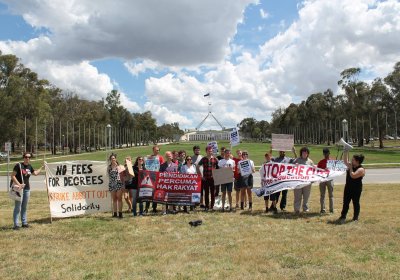Latin America 2014 conference, in solidarity with the continent's progressive struggles, was held in London on November 29 and attracted hundreds of participants.
Held in the Trade Union Congress building, it was jointly organised by several trade unions, Latin America solitary groups and other supporters of the progressive and revolutionary struggles in the region.
The participants took part in more than 30 workshops across a broad range of topics surrounding the achievements and challenges of the various governments, social and political movements across the continent.
Education
Chile’s interior minister Rodrigo Penailillo announced on December 4 that university education would be free by 2016.
The announcement comes after huge protests by Chilean students for greater equality in education that broke out under former president Sebastian Pinera's right-wing adminstration. The Socialist Party's Michelle Bachelet won presidential elections last year, in part by promising to implement many of the student movement's demands.
Students around the country are celebrating the Senate's defeat of the federal government's tertiary education reforms.
The proposed changes would have been the final act in the destruction of free tertiary education in Australia that started with the introduction of the Higher Education Contribution Scheme 25 years ago.
The government proposed removing caps on university fees, cutting course funding by about 20% on average, charging higher rates of interest on student debts and extending funding to private colleges, TAFEs and sub-bachelor programs in 2016.
Teachers from Mexico's National Autonomous University (UNAM) demanded on November 27 that the country's authorities release the 11 people arrested during the clashes between protesters and police after a march over the 43 missing Ayotzinapa students.
“Human rights organizations, press, and society have showed the brutality and violence of the police operation and the arbitrary detentions,” the teachers told reporters in a press conference, according to Mexican newspaper La Jornada.
The education reforms of the 1970s occurred in a very different political climate from today's education movements, yet there are still lessons to be learnt from it.
The political agitation and mood for change of the 1960s opened the door to a number of movements, many coming from the Vietnam War. Students were not only shocked by the disturbing images of the war on the TV news during this time, but male students were also liable to be conscripted via a lottery process.
A national strike for November 20 to protest the government’s ineffective investigation in the case of 43 missing Ayotzinapa students was announced on November 12 by the Mexican Inter-university Students Assembly, chaired by the Ayotzinapa Teacher Training School “Isidro Burgos”.
The assembly, attended by students from 79 schools, decided to support the national strike summoned by the parents of the missing students.
Stasi Hell or Workers’ Paradise? Socialism in the German Democratic Republic ― What Can We Learn From It?
John Green & Bruni de la Motte
Artery Publications, 2009
50 pp., $7.25
Red Love: The Story of an East German Family
Maxim Leo
Pushkin Press, 2013
272 pp., $31.60
The German Democratic Republic (GDR) disappeared a quarter of a century ago after 41 years’ existence. The East German state is mostly remembered as “Stasiland”, as Anna Funder’s history of its secret police is called.
Kyol Blakeney was elected President of the Student Representative Council (SRC) at the University of Sydney last month and the makeup of the new council promises a fresh approach to student politics.
Blakeney’s election win marks the first Grassroots and non-Labor candidate to run the SRC in 14 years. One of his main aims as president next year is to create more affordable living circumstances for students.
Bolivian President Evo Morales asked the Mexican government on November 10 to clarify the case of the 43 students of the Ayotzinapa teachers college. The students were forcibly disappeared in September after an attack by local police, in which six people were also killed.
“I wish to express our solidarity with the families of the 43 students,” Morales said during a press conference. “We regret what has happened in Mexico.”
Bolivian President Evo Morales has handed over three new schools and two roofed outdoor community centres in the Sacaca Municipality of the southern Potosi Department.
“We are going to continue working, your vote has not been in vain,” said Morales, who was re-elected on October 12 with more than 60% of the vote.
In the Caripuyo municipality in Potosi, Morales also inaugurated a market and an electrical system for the Caripuyo community.
The protests over the 43 missing students in Iguala, who are now said to have been assassinated and burned, have continued in Mexico City.
Hundreds of Mexicans protested overnight on November 8 in Mexico capital. They expressed theri outrage in relation to statements given the day before by the head of the attorney-general's Office, Jesus Murillo Karam, who said the 43 students were executed and burned in Ayotzinapa.
The University of Western Sydney Resistance club released this statement on October 28.
***
Student campus councillor at UWS Bankstown Mia Sanders has slammed the federal government’s higher education reform bill which went before the Senate on October 28.
- Previous page
- Page 34
- Next page








